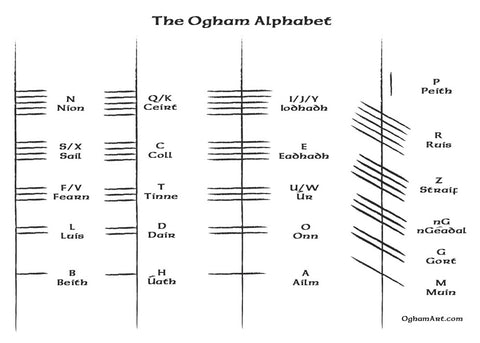Holly Tree & Ogham Letter Tinne
HOLLY
-
July 8 to August 4
-
Guidance, benevolence, tenacity, prestige
- Represented by the Ogham letter tinne ("T")
In Celtic Tree Astrology, four monumental components are celebrated: the cycles of the moon, the sacred trees of the Druids, the Ogham alphabet, and the time of your birth.
Divination tradition connects each of the 13 lunar cycles to a cherished tree which is also associated with a specific Ogham letter. The tree, as well as the Ogham letter, carry unique characteristics and qualities which are astrologically designated to the moon's cycle at the time of your birth.
In the Ogham Art Celtic Tree Astrology Series, these assigned traits are presented as nouns to be used as focus words or meditative recitations.
▪️ Presented on Mohawk Via Felt i-Tone Finish stock in a black wood frame (includes glass, open-front box, black backing with easel and installed hanger)
▪️ Outer dimensions 5.63"W x 7.63"L
▪️ Includes a descriptive label on the back of the mat and frame along with a 4x6 card explaining Celtic Tree Astrology
ABOUT THIS SERIES
The Celtic Tree Astrology Series design, expressions, and painted Ogham letters are those of Colleen Berry Conway of Ogham Art.
The artistic portrayal of each tree and leaf were created by Cindy Berry Sullivan.
The Ogham Art Celtic Astrology Series is the first time sisters Colleen and Cindy have collaborated to create a visual piece that celebrates the mark of each of them as individual artists.
Here is a brief summary of the Ogham alphabet. Stay tuned for more detailed posts in the days to come. Sign up below for the Ogham Art Newsletter to receive email notifications about new postings, blogs, products and events.
Sláinte,
Colleen & Chris
Ogham is the earliest written form of Primitive Irish, the oldest of the Gaelic languages. Ogham was first used in Ireland and parts of England, Scotland and Wales between the 2nd and 6th centuries. Though its actual origins remain a mystery today, it is believed the Celts desired a cryptic alphabet that could not be deciphered by Roman Britain.


Represented as a series of perpendicular and intersecting lines, this ancient script is thought to be influenced by the Latin alphabet using 20 characters. It is most commonly written vertically and is read from bottom to top. When presented horizontally, it is read from left to right.












